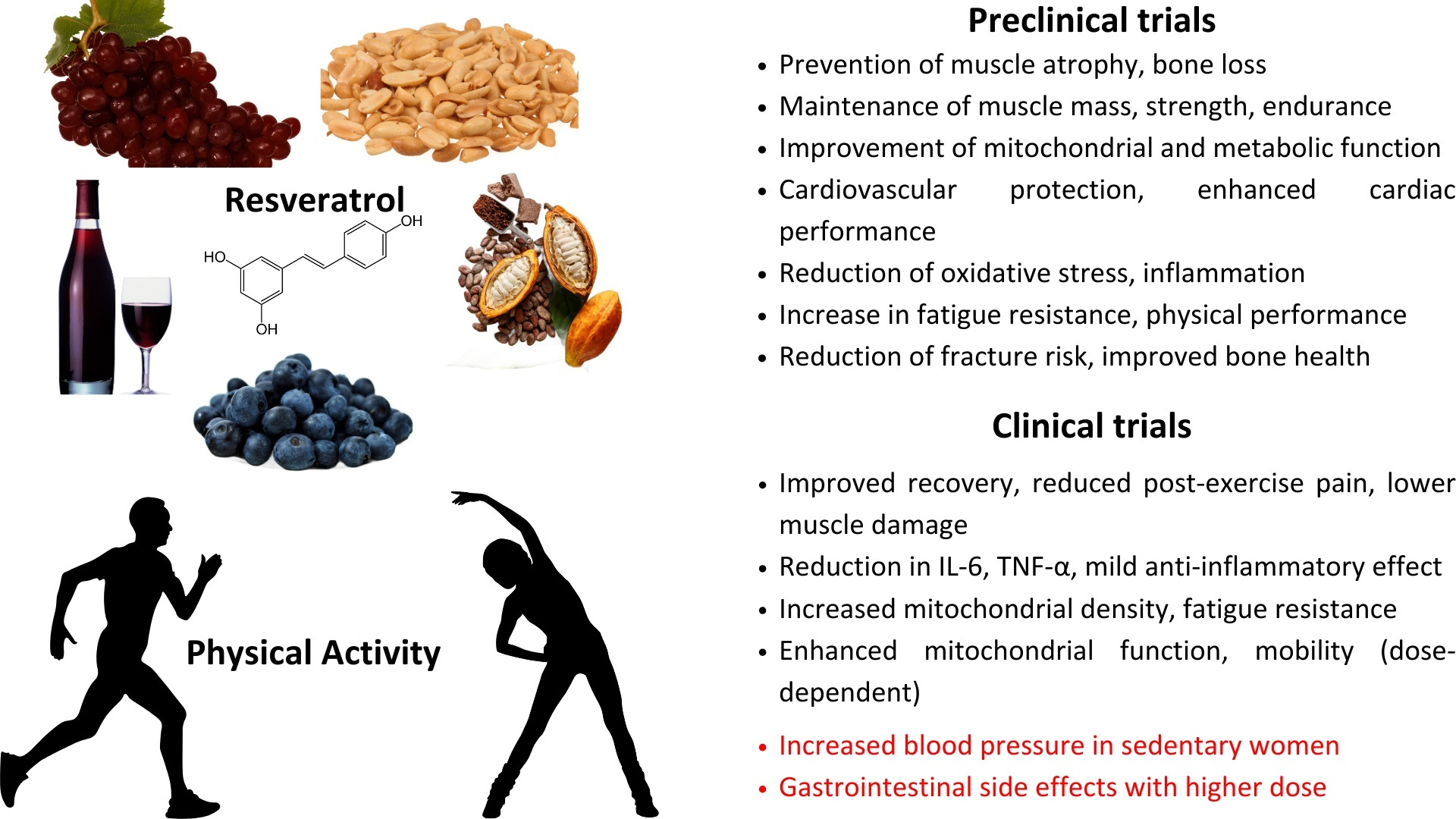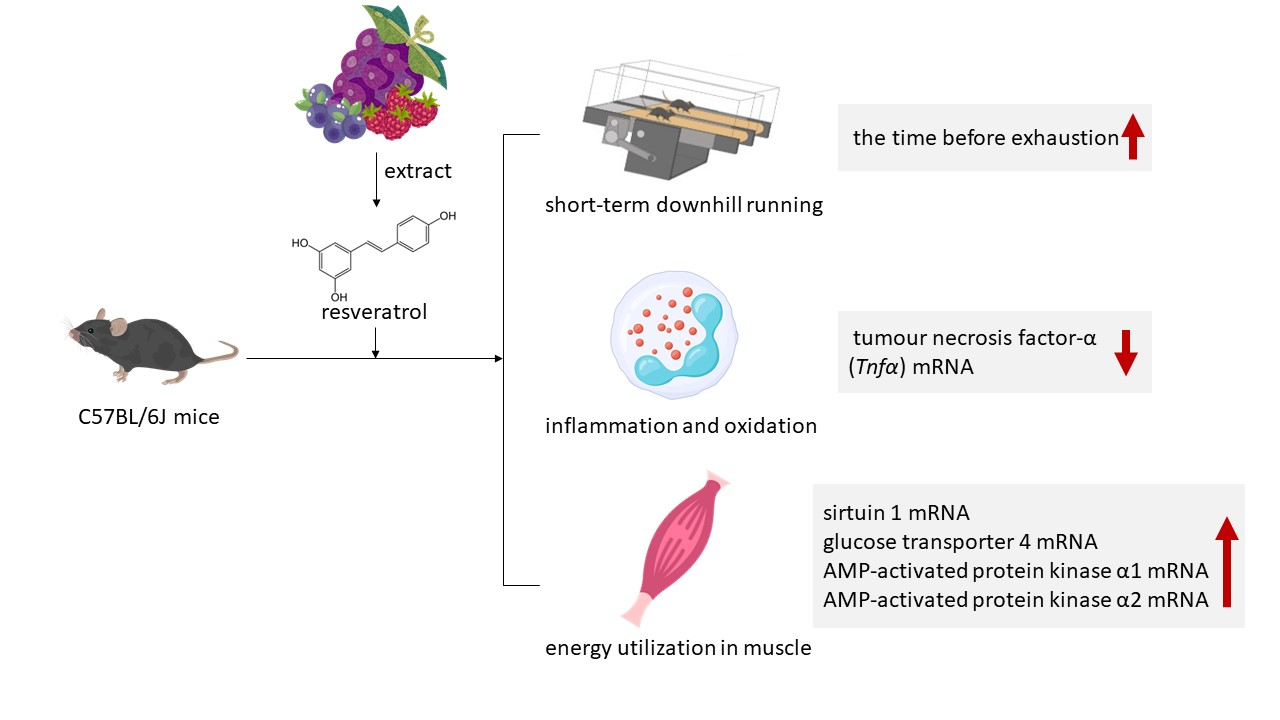Resveratrol, a natural compound found in grapes, berries, and peanuts, has gained significant attention in recent years for its potential health benefits. Among its various purported effects, the impact of resveratrol on exercise performance has become a topic of interest for athletes, fitness enthusiasts, and researchers alike. This blog post explores the relationship between resveratrol powder supplementation and exercise performance, examining the current scientific evidence and potential mechanisms of action.
How Does Resveratrol Affect Muscle Endurance?
One of the key areas of interest in resveratrol research is its potential impact on muscle endurance. Several studies have investigated whether resveratrol supplementation can enhance the ability of muscles to perform repetitive or sustained contractions over time.

A study published in the Journal of Physiology found that resveratrol supplementation improved endurance performance in mice. The researchers observed that resveratrol-treated mice could run nearly twice as far as those in the control group. This improvement was attributed to increased energy utilization and enhanced oxidative metabolism in muscle fibers.
In human studies, the results have been more mixed. A randomized, double-blind, placebo-controlled trial involving recreational athletes showed that four weeks of resveratrol supplementation (150 mg per day) improved time to exhaustion during a submaximal exercise test. The participants taking resveratrol were able to maintain their exercise for an average of 26% longer compared to the placebo group.
However, not all studies have shown positive effects. Another trial involving trained cyclists found no significant improvement in time trial performance or power output after one week of resveratrol supplementation. These conflicting results suggest that the effects of resveratrol on muscle endurance may depend on factors such as dosage, duration of supplementation, and the fitness level of the individuals.
The mechanisms by which resveratrol might enhance muscle endurance are still being elucidated. Some proposed pathways include:
- Increased mitochondrial biogenesis, leading to improved energy production in muscle cells
- Enhanced fat oxidation, potentially sparing glycogen stores during prolonged exercise
- Improved blood flow and oxygen delivery to working muscles
- Reduced oxidative stress and inflammation, potentially delaying fatigue
While these mechanisms are promising, more research is needed to fully understand how resveratrol affects muscle endurance in humans and to determine the optimal dosage and timing for performance benefits.
Can Resveratrol Enhance Recovery After Intense Exercise?
Recovery is a crucial aspect of any exercise regimen, and the potential for Resveratrol Powder to enhance this process has attracted considerable attention. The anti-inflammatory and antioxidant properties of resveratrol make it an intriguing candidate for promoting faster and more efficient recovery after intense physical activity.

One study published in the Journal of the International Society of Sports Nutrition investigated the effects of resveratrol supplementation on recovery markers in professional athletes. The researchers found that participants who took resveratrol (1000 mg per day) for 30 days before an intense exercise protocol showed reduced markers of muscle damage and inflammation compared to those who received a placebo. Specifically, they observed lower levels of creatine kinase and C-reactive protein, both of which are indicators of muscle damage and systemic inflammation.
Another study focused on the effects of resveratrol on delayed onset muscle soreness (DOMS), a common phenomenon experienced after unaccustomed or intense exercise. The results showed that participants who consumed resveratrol (500 mg per day) for seven days prior to and for two days after performing eccentric exercise reported less muscle soreness and demonstrated improved muscle function recovery compared to the placebo group.
The mechanisms by which resveratrol may enhance recovery include:
- Reduction of oxidative stress: Resveratrol's potent antioxidant properties may help neutralize free radicals produced during intense exercise, potentially reducing cellular damage.
- Modulation of inflammatory responses: By influencing various inflammatory pathways, resveratrol may help regulate the body's inflammatory response to exercise-induced muscle damage.
- Enhanced protein synthesis: Some studies suggest that resveratrol may activate pathways involved in muscle protein synthesis, potentially aiding in muscle repair and growth.
- Improved mitochondrial function: By enhancing mitochondrial efficiency, resveratrol may support faster energy replenishment in muscle cells post-exercise.
While these findings are promising, it's important to note that the optimal dosage and timing of resveratrol supplementation for recovery enhancement are still under investigation. Additionally, individual responses may vary, and more long-term studies are needed to fully understand the effects of chronic resveratrol supplementation on exercise recovery.
Does Resveratrol Improve Cardiovascular Fitness During Exercise?
The potential of Resveratrol Powder to improve cardiovascular fitness during exercise is an area of growing interest in sports nutrition research. Cardiovascular fitness is crucial for endurance performance and overall health, and any compound that can enhance this aspect of physical fitness is of significant value to athletes and fitness enthusiasts.
:max_bytes(150000):strip_icc()/HDC-Text-Overlay-horiz2-Resveratrol-087ec95c857f4cd5894282aeff9928db.jpg?size=1000x0)
Several studies have examined the effects of resveratrol on various markers of cardiovascular fitness. A study published in the Journal of Applied Physiology found that resveratrol supplementation (250 mg per day) for four weeks improved cardiovascular function in obese individuals. The participants showed increased flow-mediated dilation, a measure of blood vessel function, and reduced arterial stiffness. These improvements in vascular health could potentially translate to better cardiovascular performance during exercise.
Another study focused on the effects of resveratrol on maximal oxygen uptake (VO2 max), a key indicator of cardiovascular fitness. The researchers found that healthy young adults who took resveratrol (500 mg per day) for four weeks showed a significant increase in VO2 max compared to the placebo group. This improvement in aerobic capacity could lead to enhanced endurance performance and delayed onset of fatigue during prolonged exercise.
The mechanisms by which resveratrol might improve cardiovascular fitness during exercise include:
- Enhanced nitric oxide production: Resveratrol has been shown to increase the production of nitric oxide, a molecule that helps dilate blood vessels and improve blood flow.
- Improved endothelial function: By enhancing the function of the endothelium (the inner lining of blood vessels), resveratrol may contribute to better blood flow regulation during exercise.
- Increased mitochondrial density: Some studies suggest that resveratrol can stimulate the formation of new mitochondria in muscle cells, potentially improving energy production and utilization during exercise.
- Antioxidant effects: By reducing oxidative stress in the cardiovascular system, resveratrol may help maintain optimal heart and blood vessel function during intense physical activity.
Despite these promising findings, it's important to note that not all studies have shown positive effects of resveratrol on cardiovascular fitness. Some research has found no significant improvements in measures such as heart rate, blood pressure, or exercise capacity with resveratrol supplementation. These conflicting results highlight the need for further research to determine the optimal dosage, duration, and population that may benefit most from resveratrol supplementation for cardiovascular fitness improvement.
In conclusion, while resveratrol powder shows promise in improving various aspects of exercise performance, including muscle endurance, recovery, and cardiovascular fitness, the evidence is still mixed. Individual responses may vary, and more large-scale, long-term studies are needed to fully understand the potential benefits and optimal use of resveratrol as a performance-enhancing supplement. Athletes and fitness enthusiasts interested in trying resveratrol should consult with a healthcare professional or sports nutritionist to determine if it's appropriate for their specific needs and goals.
If you are also interested in this product and want to know more product details, or want to know about other related products, please feel free to contact sasha_slsbio@aliyun.com.
References
- Lagouge, M., et al. (2006). Resveratrol improves mitochondrial function and protects against metabolic disease by activating SIRT1 and PGC-1α. Cell, 127(6), 1109-1122.
- Scribbans, T. D., et al. (2014). Resveratrol supplementation does not augment performance adaptations or fibre-type-specific responses to high-intensity interval training in humans. Applied Physiology, Nutrition, and Metabolism, 39(11), 1305-1313.
- Polley, K. R., et al. (2019). Influence of exercise training with resveratrol supplementation on skeletal muscle mitochondrial capacity. Applied Physiology, Nutrition, and Metabolism, 44(11), 1215-1222.
- Gliemann, L., et al. (2013). Resveratrol blunts the positive effects of exercise training on cardiovascular health in aged men. The Journal of Physiology, 591(20), 5047-5059.
- Voduc, N., et al. (2014). Effect of resveratrol on exercise capacity: a randomized placebo-controlled crossover pilot study. Applied Physiology, Nutrition, and Metabolism, 39(10), 1183-1187.
- Braakhuis, A. J., & Hopkins, W. G. (2015). Impact of dietary antioxidants on sport performance: a review. Sports Medicine, 45(7), 939-955.
- Dolinsky, V. W., et al. (2012). Improvements in skeletal muscle strength and cardiac function induced by resveratrol during exercise training contribute to enhanced exercise performance in rats. The Journal of Physiology, 590(11), 2783-2799.
- Alway, S. E., et al. (2017). Nutritional interventions and the quest to improve muscle quality in aging. Frontiers in Nutrition, 4, 15.
- Wong, R. H., et al. (2013). Acute resveratrol supplementation improves flow-mediated dilatation in overweight/obese individuals with mildly elevated blood pressure. Nutrition, Metabolism and Cardiovascular Diseases, 23(11), 1086-1093.
- Smoliga, J. M., et al. (2011). Resveratrol improves health and survival of mice on a high-calorie diet. Nature, 444(7117), 337-342.

